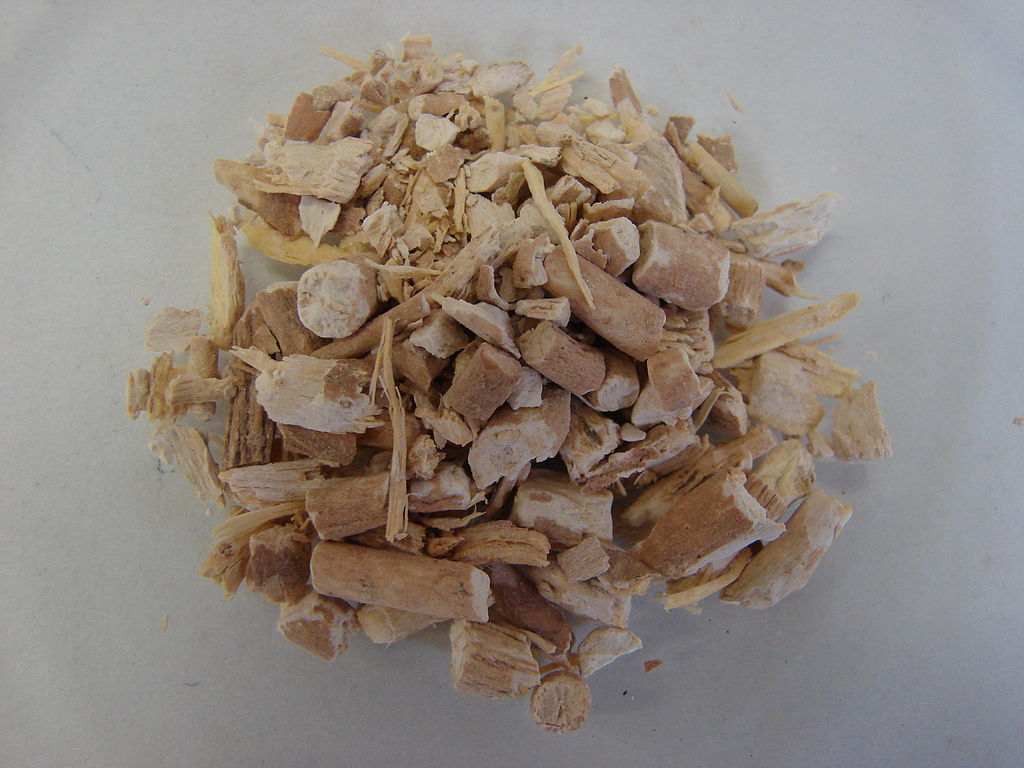Traditional Indian herb ashwagandha may improve hypothyroidism by increasing thyroid hormone levels.

Ashwagandha is a popular Indian medicinal herb with a wide range of health benefits. In terms of thyroid health, it is increasingly being used to:
- Alleviate hypothyroidism. Animal and early human studies report that ashwagandha increases thyroid hormone levels.
Overview
Withania somnifera, better known as ashwagandha, is a flowering shrub particularly common in India. Ashwagandha – and its roots in particular – has been utilized by India’s folk Ayurvedic medicine for thousands of years. Its effects are best summarized as being adaptogenic, meaning they help the body adapt to various forms of environmental stress and maintain homeostasis (balance). For example, ashwagandha has traditionally been used to help with:
- Depression, anxiety, and other mental disorders
- Inflammatory conditions such as arthritis
- Cold infections and fever
- Sexual function
- Insomnia
Modern clinical research has confirmed that ashwagandha has a wide range of beneficial properties, including antioxidant, anxiolytic, antidepressant, cardioprotective, immuno-modulating, antibacterial, antifungal, anti-inflammatory, neuroprotective, and cognition-enhancing effects.
In addition, early research indicates that ashwagandha can stimulate the thyroid gland and increase thyroid hormone levels. Because of this, it is frequently included in supplements meant to improve hypothyroidism.

How Ashwagandha Might Help With Thyroid Health
Boosting thyroid hormone levels
Ashwagandha has been shown to increase the levels of either one (thyroxine, T4) or both thyroid hormones (T4 and triiodothyronine, T3). However, researchers are not entirely sure about the biological mechanism behind this thyroid-stimulatory effect. The most popular hypothesis is that ashwagandha’s antioxidant effects are responsible. Another possibility is that ashwagandha can boost thyroid function by reducing the effects of chronic stress.
Ashwagandha Reputation & Uses for Thyroid Health
Ashwagandha holds a popular reputation as a rejuvenating herb that helps bring the body back to a state of balance (homeostasis). This reputation includes the belief that it can alleviate hypothyroidism by stimulating the thyroid to increase thyroid hormone production. As such, ashwagandha is frequently taken as a standalone thyroid supplement and included in multi-ingredient thyroid support formulas.
This popular use is backed by early animal and human research evidence showing that ashwagandha does indeed increase thyroid hormone levels in both healthy and hypothyroid subjects. Nonetheless, more high-quality clinical trials are needed to confirm these thyroid benefits.
Research
Animal Research
Several animal studies have looked at the effects of ashwagandha on thyroid function. Their findings suggest that ashwagandha stimulates thyroid activity, resulting in the production of more thyroid hormones (T3 & T4).
Ashwagandha appears to increase thyroid hormone levels in male mice
This study examined the effects of ashwagandha on thyroid function in rodents. Male mice were given ashwagandha root extract (1.4 g per kg of body weight) daily for 20 days, resulting in increased levels of both thyroid hormones (T3 & T4).
- The researchers concluded that “…ashwagandha root extract stimulates thyroidal activity…” 1
Ashwagandha appears to increase thyroxine (T4) levels in female mice
In this study, ashwagandha root extract (1.4 g per kg of body weight) and Bauhinia purpurea – another medicinal herb – were administered to female mice for 20 days. Ashwagandha was found to increase levels of thyroxine (T4), whereas Bauhinia purpurea increased both T4 & T3.
- The researchers concluded that “…these plant extracts are capable of stimulating thyroid function in female mice.” 2
Ashwangadha may alleviate medication-induced hypothyroidism in diabetic mice
This study examined whether ashwagandha and Bauhinia purpurea extracts could prevent hypothyroidism caused by the antidiabetic medication metformin. Type 2 diabetic mice were given metformin for 15 days with or without ashwagandha root extract (1.4 g per kg of body weight) or Bauhinia purpurea extract. Whereas the mice given only metformin had severe hypothyroidism, the mice co-treated with ashwagandha or bauhinia had their thyroid hormone levels restored back to normal.
- The researchers concluded that “…the evaluated plant extracts have a potential to ameliorate metformin-induced hypothyroidism in Type 2 diabetic subjects.” 3
In this study, a combination of three herbal extracts known for their thyroid-stimulating effects – ashwagandha, guggul, and bauhinia – was given to mice. After 30 days of daily supplementation with a blend of 1.4 g/kg ashwagandha, 0.2 g/kg guggul, and 2.5 g/kg bauhinia, the mice experienced increased levels of both thyroid hormones (T3 & T4).
- The researchers concluded that “…these plant extracts, given in combination, stimulate thyroid function without hepatotoxic effects.” 4
Human Research
Limited clinical evidence suggests that ashwagandha can increase thyroid hormone levels in humans.
Ashwagandha extract (500 mg) may increase thyroxine (T4) levels
This randomized, double-blind, placebo-controlled study looked at the effects of ashwagandha in people with bipolar disorder. The researchers gave bipolar patients placebo or ashwagandha extract (Sensoril, 500 mg) daily for 8 weeks and also recorded its effects on thyroid function. They found that ashwagandha supplementation reversed subclinical hypothyroidism in one person, and significantly raises levels of thyroxine in three people (by 7%, 12%, and 24%).
- The researchers concluded that “…the thyroid enhancing properties of ASW may also represent a clinical opportunity for the treatment of subclinical hypothyroidism.” 5
Ashwagandha can increase thyroid hormone levels
This report described the case of an otherwise healthy 32-year-old woman who developed thyrotoxicosis (elevated thyroid hormone levels) after taking a supplement containing ashwagandha for over a month. Her thyroid levels returned to normal after she stopped taking the supplement, suggesting that “ashwagandha can increase serum concentrations of thyroid hormone.” 6
Dosage for Thyroid Health
- There is no research-backed dose of ashwagandha for thyroid function
- Standalone ashwagandha supplements supply doses ranging from 450 – 1000 mg
- Multi-ingredient thyroid support formulas frequently include 120 – 200 mg of ashwagandha
Available Forms
- Ashwagandha root powder is the most common form, typically sold in capsules.
- Ashwagandha supplements can also be standardized to contain a certain % of bio-active withanolides.
- Sensoril® is a branded ashwagandha extract that is standardized to 10% withanolides and is backed by clinical research.
Supplements in Review Recommendation
- Ashwagandha, 500+ mg for thyroid health.
Early research demonstrates that ashwagandha raises thyroid hormone. Although we’d like to see high-quality human clinical trials before recommending ashwagandha, all current evidence is supportive of its ability to boost thyroid hormone levels.
Start with 500 mg daily. Although there isn’t enough evidence for a research-recommended dose, we suggest starting with 500 mg daily and moving up if necessary. If possible, you should try to use the Sensoril brand because that is currently the only ashwagandha product shown to increase thyroid hormone levels in a human study.
Leave a Reply